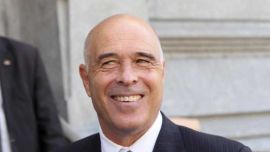One of the biggest corruption investigations in history, Brazil's Operação Lava Jato ("Operation Car Wash"), which felled presidents and powerful players across Latin America, wrapped up this week after falling into scandal itself.
The task force, which began as a probe into money laundering at a Brasilia gas station in March 2014, soon blew the lid off a sprawling tangle of corruption reaching the highest levels of government and industry in Brazil, with tentacles stretching across Latin America and into Africa.
Using aggressive plea-bargain tactics to get suspects to rat out their superiors, prosecutors uncovered how politicians systematically conspired with executives at companies such as Brazilian oil giant Petrobras and construction giant Odebrecht to inflate government contracts and pocket the proceeds for themselves and their parties.
A fearsome force whose exploits inspired a movie and Netflix series, the hard-hitting prosecutors shared their dirt with colleagues around the world.
The long list of people sent to jail by the investigation and its international spinoffs includes former presidents Luiz Inácio Lula da Silva of Brazil, Alejandro Toledo of Peru and Ricardo Martinelli of Panama, plus top executives at Petrobras, Odebrecht and several other firms.
But despite the operation's spectacular list of accomplishments – 174 people convicted in Brazil, 12 current or former presidents implicated across Latin America, US$790 million returned to Brazil's public coffers, with nearly US$2.8 billion more on the way – the attorney general's office announced Wednesday without fanfare that its main investigative team had been disbanded.
Ironically, the news came under a leader who arguably owes his job to Car Wash: far-right President Jair Bolsonaro, the self-styled outsider who rode a wave of anti-establishment outrage to victory in Brazil's 2018 elections.
"The politician who most benefited from Brazil's anti-corruption probe has put the final nail in its coffin," Brazilian sociologist Celso Rocha de Barros wrote in Americas Quarterly.
Damp squib
Bolsonaro had long been saying the task force's days were numbered.
"I've ended Lava Jato, because there's no more corruption in government," he said last October.
The claim was easy to fact-check: the following week, the deputy leader of Bolsonaro's coalition in the Senate was caught with around 30,000 reais (more than US$5,000) in his underwear during a police raid for suspected embezzlement of Covid-19 funds.
In reality, with his family and inner circle facing multiple graft investigations, Bolsonaro the president has shown far less anti-corruption fervour than Bolsonaro the candidate.
The Lava Jato announcement came days after he sealed a new alliance with the "Centrão," a loose coalition of parties known primarily for plumbing the pork barrel.
The move aims to improve his relations with Brasilia's political establishment and ensure none of the 61 impeachment cases against him come before Congress.
But it puts the president in open alliance with parties that play the kind of politics he campaigned against, and that was at the heart of the Lava Jato investigation.
Fallen superheroes
Lava Jato's undoing was also partly its own.
The operation got embroiled in scandal itself in 2019 when an investigative website published hacked phone messages showing how the chief Lava Jato judge, Sergio Moro, conspired with prosecutors to keep leftist ex-president Lula from running in the 2018 presidential election.
Lula, then the most popular politician in Brazil, was sidelined when Moro jailed him on charges stemming from Lava Jato.
Moro controversially went on to accept the post of justice minister under Bolsonaro, who won the election.
Their uneasy marriage ended in divorce last April when Moro resigned, accusing Bolsonaro of interfering in federal police investigations.
The saga tarnished both Moro and the Lava Jato prosecutors, once widely revered as caped crusaders bringing evildoers to justice without fear or favour.
Uncertain legacy
It is unclear what the seven-year operation's legacy will be. The attorney general's office said some from the task force would be redeployed to a new anti-organised crime unit.
But the prosecutors have grumbled in the Brazilian press that their wings have been clipped.
Additionally, the Supreme Court has now ruled against some of the hardball tactics that made the task force so effective, including compulsory testimony for suspects.
"There was an argument that Brazil had to bend the rules of constitutional democracy because its justice system never convicted the powerful," said law professor Daniel Vargas of the Getúlio Vargas Foundation.
"But experience showed that bending those rules undermined the entire justice system and constitutional democracy itself," he told AFP.
Still, the operation accomplished what had long seemed impossible in Brazil and across the region: bring those in power to justice for stealing the people's money.
"For seven years, Brazil wasn't Brazil," wrote journalist JR Guzzo in a column for Gazeta do Povo, a newsweekly in Curitiba, the southern city where the task force was based.
"In the Brazil of Operation Lava Jato, politicians and other corrupt individuals of all shapes and sizes actually risked going to jail."
by Joshua Howat Berger, AFP


























Comments